Aluminum 6061 is an aluminum alloy with magnesium(Mg), and silicon(Si) and is one of the most popular alloys used in the aircraft and automotive industries due to its versatility and strength. In this chart below, we can see the different properties between the aluminum groups.
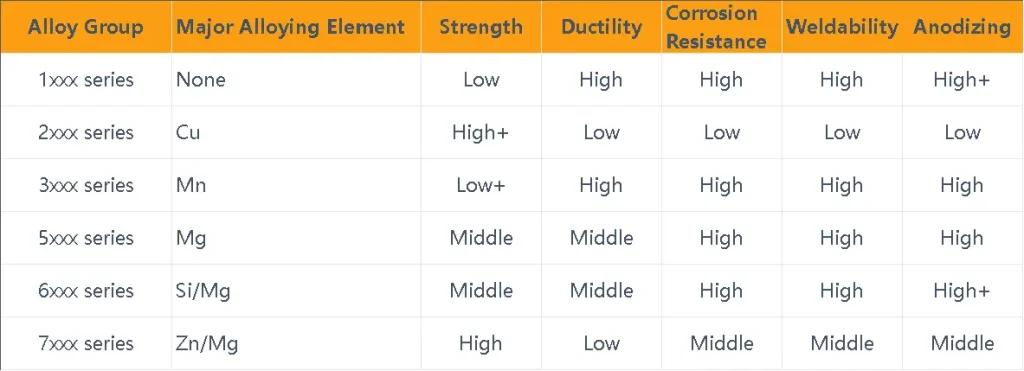
The favorable mechanical properties of aluminum 6061 such as corrosion-resistant, weldability and anodizing, has led to its widespread use in numerous industries and applications where a lightweight, strong material is required.
6061 Sheets Types
1. Flat sheet: Aluminum 6061 flat sheet has a flat surface and uniform thickness, and is commonly used in the construction, aerospace, automotive, and electronics industries, among others.
2. Decorative sheet: Aluminum 6061 decorative sheet is usually surface treated, such as anodized or painted, to provide more appearance options and durability. They are commonly used for interior decoration, billboards, exhibition displays and exterior wall decoration, etc.
3. Al 6061 T6 sheet: Aluminum 6061 sheet with T6 aging treatment has high strength and hardness, which is suitable for structural and engineering applications requiring high strength, such as aircraft parts, ship components and vehicle chassis.
4. Aluminum 6061-O sheet: After being treated with a solid solution without being aged, aluminum 6061 sheet (O state) has a high degree of plasticity and deformation capacity, making it appropriate for deep drawing, forming, stamping, and other processing techniques.
5. Aluminum 6061-H22/H32/H38 sheets: These flat-treated sheets are appropriate for uses needing great strength and resistance to corrosion, like fuel tanks, food processing equipment, and chemical industry equipment.
6. Aluminum 6061-T651 sheet: Excellent strength and minimal deformation capacity characterize this aging-treated aluminum 6061 sheet, which is ideal for applications needing high stiffness and strength including molds, mechanical parts, and aerospace structural components.
These are some of the common types of aluminum 6061 sheet. You can indicate the desired properties, dimensions and process requirements. Aluminum 6061 sheet is widely used in a variety of industries and fields due to its excellent strength, machinability, and corrosion resistance, and the demand for it is the largest among many aluminum alloys, especially Al 6061 T6, the most common alloy and temper used in industrial manufacturing.
According to the industrial manufacturing requirements, we can shape aluminum materials can be divided into aluminum sheets, coils, discs, strips, colored aluminum, embossed aluminum and so on.
Aluminum sheet
Aluminum Grade Aluminum 6061
Temper F,O,T4,T6,T651,H112
Thickness 0.10mm-350mm
Width 100 mm-2600 mm
Length Any length, according to the transportation, usually less than 12m.
Surface treatment Mill finish, coated, anodized, mirror, embossed, checkered, etc.
Application Mobile phone card slot, mobile phone case, mold, automobile, mask machine, precision machining, etc.
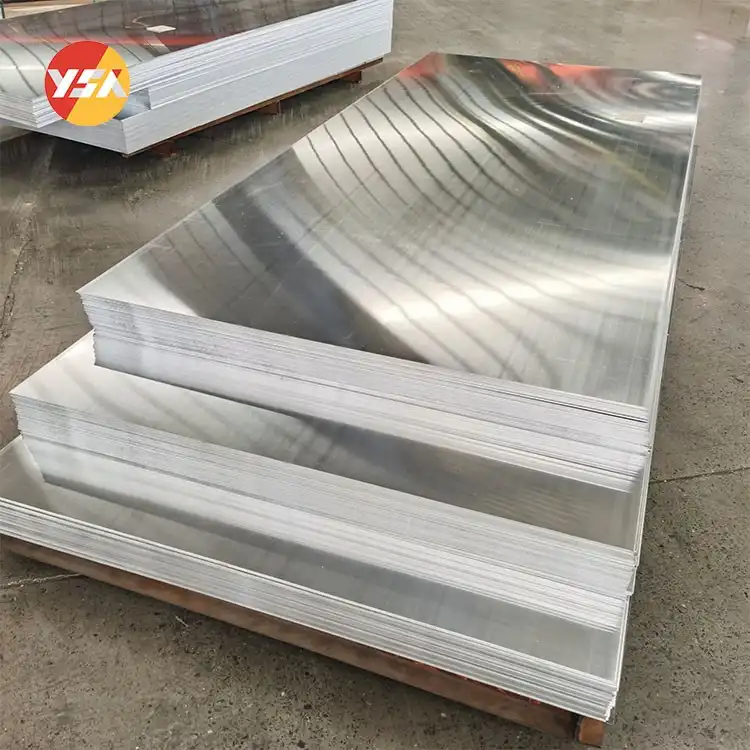
Bobine d'aluminium
Aluminum Grade Aluminum 6061
Temper F,O,T4,T6,T651
Thickness 0.006 mm-8.0 mm
Width 3 mm-2600 mm
Length Any length by requirements
Surface treatment Mill finish, coated, anodized, mirror, embossed, checkered, etc.
Application Internal and external wall panels, floors, compartment panels, etc. of rail transit vehicles.
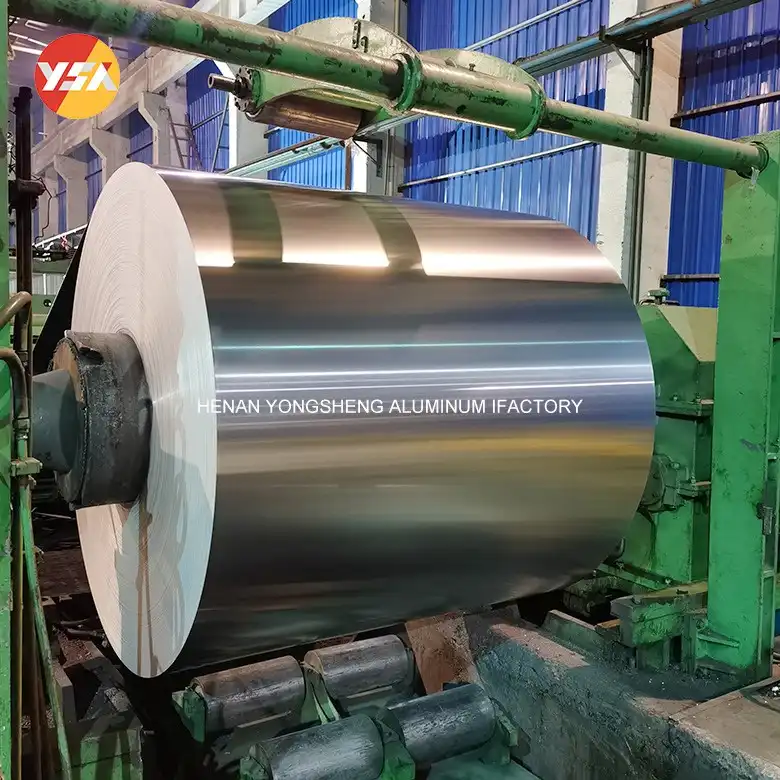
Bande d'aluminium
Aluminum Grade 6061
Temper T4, T6, T651, etc.
Thickness 0.1 mm-6.5 mm
Width 3mm-2600mm
Length Any length by requirements
Surface Treatment Mill finish、coated、powder coated、anodized、polished mirror、embossed、etc.
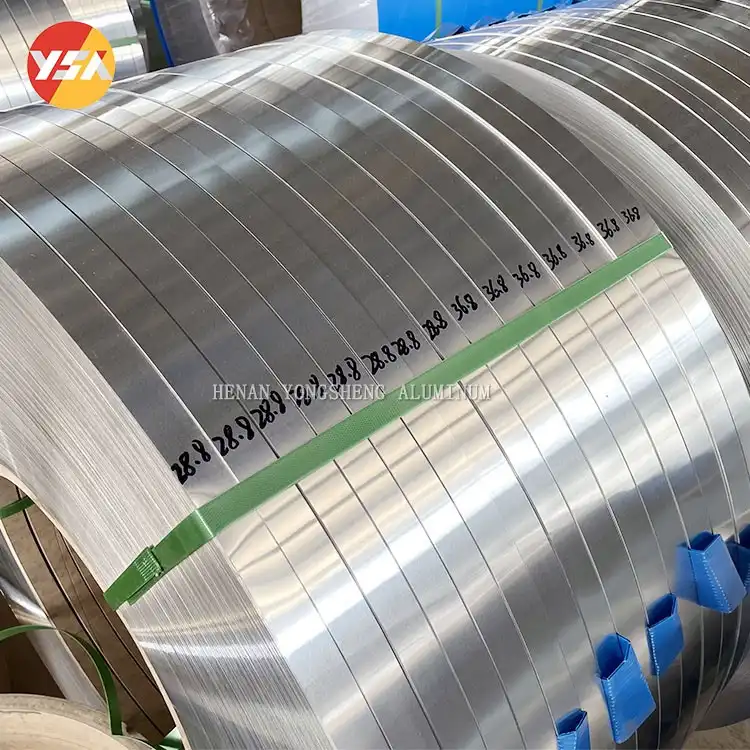
Aluminium coloré
Aluminum Grade 1000, 3000, 5000, 6000, 8000 Series
Color Custom
Temper O-H112,T3-T8,T351-T851
Thickness 0.02 mm-6.5 mm
Width 10 mm-2000 mm
Surface treatment PVDF Coating , PE Coating, etc.
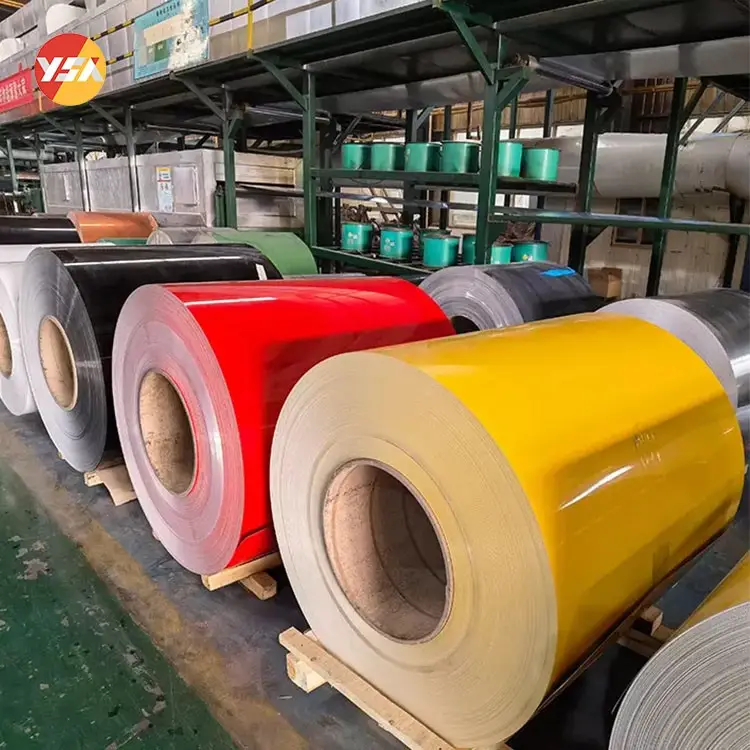
Aluminium gaufré
Aluminum Grade 1000, 3000, 5000, 6000, 8000 Series
Form Coil, Sheet, Sheet
Temper O-H112, O / H14 / H32 / H24
Thickness 0.13 mm-6.5 mm
Patterns Classic, 1-5 bars, Checker, Altered, Diamond, Stucco, etc.
Surface treatment Mill finish, coated, anodized, mirror, embossed, checkered, etc.
Application Pots, utensils, cooker, lamp, LED shell, traffic signs, etc.
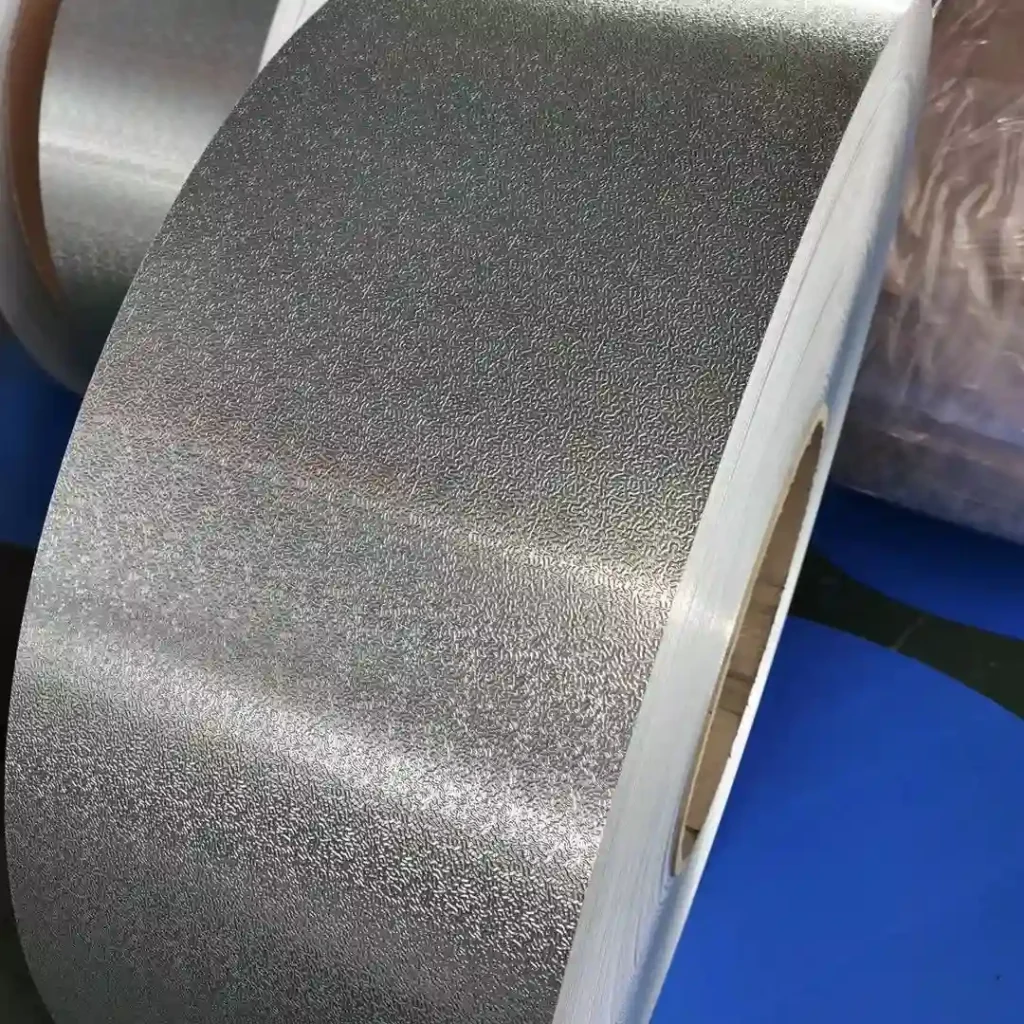
Cercle d'aluminium
Aluminum Grade 1000, 3000, 5000, 6000 series, etc.
Temper O-H112, etc.
Width 50mm-1600mm, Customized
Thickness 0.2 mm- 8 mm
Surface Treatment Mill finish, coating
Applications: Suitable for making pots, pans, pizza pans, pie sheets, cake pans, lids, kettles, basins, fryers, reflectors.
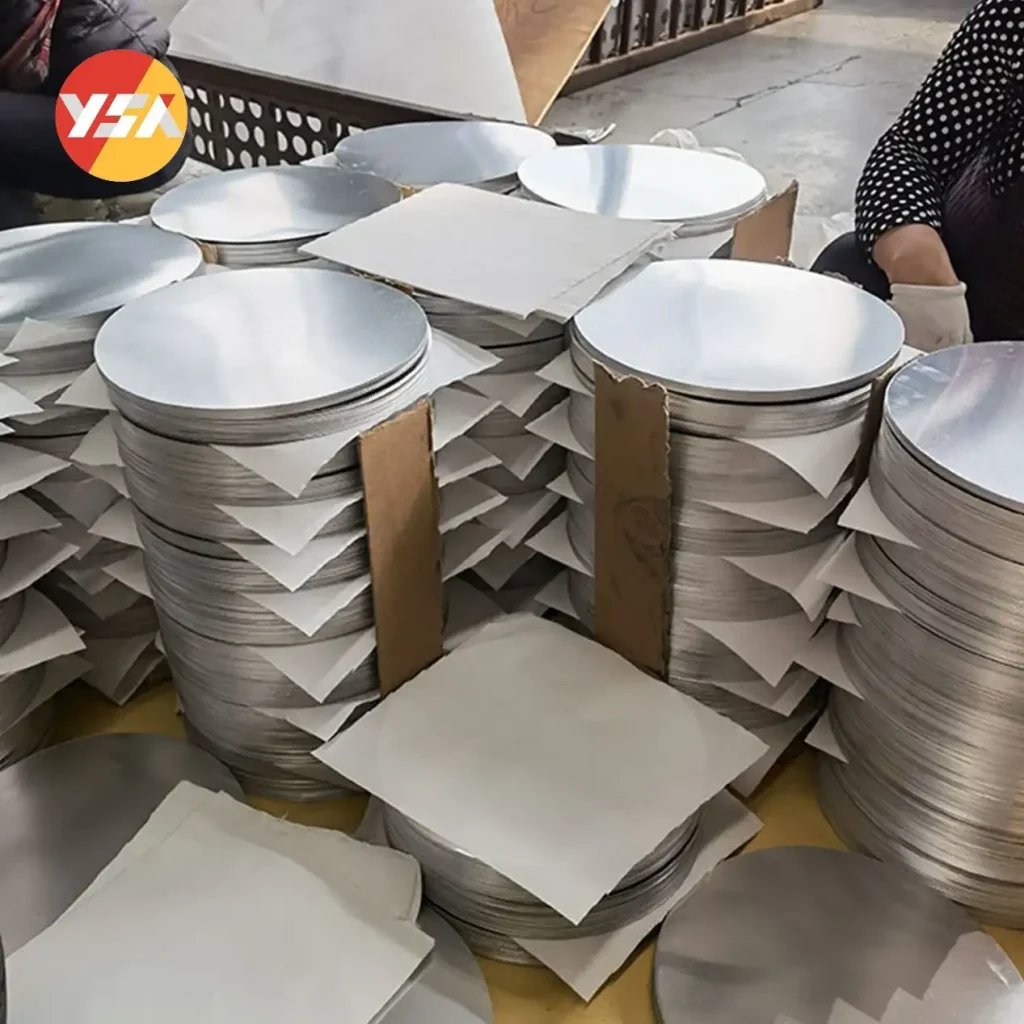
Aluminum 6061 Standards and Certificates
Standards ASTM-B209, EN573-1, GB/T3880.1-2006, GB/T 24001-2016, GB/T 19001-2016
Certificats ISO, RoHS

Applications of Aluminum 6061
Aluminum 6061 is an alloy that is commonly used in a variety of industrial applications. It offers excellent machinability, weldability and corrosion resistance, making it a preferred choice in many industries, including aerospace, transportation, construction and marine engineering.
1. Structural Components: Aluminum 6061 is frequently employed in the construction of structural components due to its high strength-to-weight ratio. It is used in the fabrication of beams, columns, bridges, and other load-bearing structures in the aerospace, automotive, and marine industries.
2. Transportation: Aluminum 6061 is widely utilized in the transportation sector. It is used in the manufacturing of aircraft parts, automotive frames, bicycle frames, and other lightweight structures. Its combination of strength, corrosion resistance, and lightness makes it an ideal material for improving fuel efficiency and reducing vehicle weight.

3. Industrial Machinery: Aluminum 6061 is employed in various industrial machinery applications. It is used for manufacturing machine parts, frames, and structures where strength, corrosion resistance, and dimensional stability are required. The alloy’s machinability also makes it suitable for precision components.
4. Electrical Enclosures: Aluminum 6061 is used in the production of electrical enclosures and housings due to its electrical conductivity and corrosion resistance. It is commonly employed in the construction of electronic equipment, control panels, and electrical cabinets.
5. Consumer Goods: Aluminum 6061 finds application in the production of consumer goods such as furniture frames, sporting equipment, and recreational vehicles. Its lightweight nature, durability, and resistance to corrosion make it a popular choice for various consumer products.
6. Heat Sinks: Aluminum 6061 is often utilized in heat sink applications due to its excellent thermal conductivity. Heat sinks made from this alloy are used to dissipate heat generated by electronic components, such as computer processors and LED lights.
While mentioning so many application scenario, the applications of aluminum 6061 is way beyond the examples above.
Aluminum 6061 Composition
Element Content (%)
Aluminum, Al >97.94
Magnesium, Mg 0.35-0.8
Silicon, Si 0.3-0.7

Aluminum 6061 Physical Properties
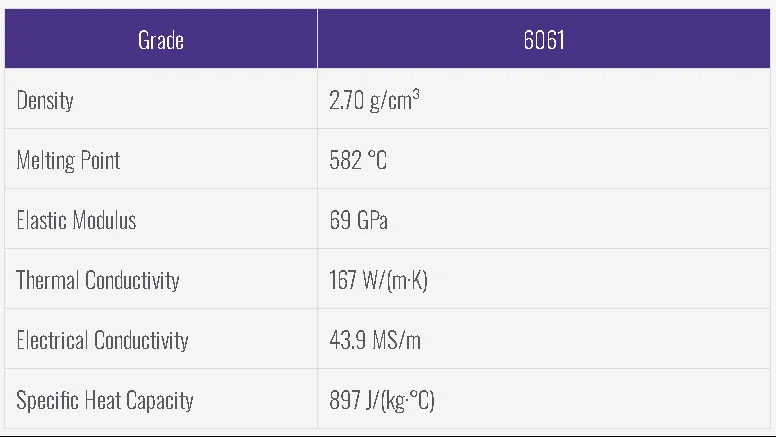
Density 2.7 g/cm3 0.0975 lb/in3
Melting point Around 582-650°C (1079-1200°F)
Elastic modulus Approximately 68-73 GPa (10,000-11,000 ksi)
Thermal conductivity About 150-200 W/m·K
Aluminum 6061 Mechanical Properties
Tensile Strength 310 MPa -415 MPa
Yield Strength 276 MPa-310 MPa
Elongation 12-16%
Hardness, Brinell 95 to 97
Résistance à la corrosion
Aluminum 6061 offers excellent corrosion resistance, making it a great choice for applications that face exposure to harsh environments or chemicals. It can be treated with coatings or anodizing to further increase its corrosion resistance if needed.
Heat Resistance
Aluminum 6061 also has good heat resistance properties, making it suitable for applications that require high temperatures. Its heat-resistant properties make it a great choice for aerospace applications where extreme temperatures can be encountered during flight.
Heat Treatment
Aluminum 6061 can easily be heat treated to achieve different levels of hardness and strength depending on the application’s needs. This makes it highly versatile and applicable to many different uses. For example, it can be strengthened through ageing or tempered to increase its toughness while retaining its formability.
Machining
Another benefit of aluminum 6061 is that it is relatively easy to machine and fabricate compared to other metals such as steel or titanium. This makes it ideal for applications where complex shapes need to be created, or parts must fit together precisely without significant waste material produced during machining.
Welding
Finally, aluminum 6061 can also be readily welded using any common welding technique, including gas tungsten arc welding (GTAW) or gas metal arc welding (GMAW). While there are some precautions you must take when welding aluminum, such as preheating the material before welding starts, this alloy forms strong welds with great ductility when proper techniques are employed.

As a strong and lightweight material, aluminum 6061 can be used for intricate components for manufacturing purposes and in forming complicated shapes for machinery and equipment. It also has the ability to withstand temperatures just above 200 degrees Celsius which allows its use in exposed positions such as engine manifolds or when parts are subjected to high heat. Its superior strength makes it ideal for creating products that handle heavy loads, such as load-bearing structures in bridges or platforms. All these uses show aluminum 6061 is one of the most versatile materials available to engineers today.
Conclusion
In conclusion, aluminum 6061 is a versatile alloy with many desirable properties, including excellent corrosion resistance, heat resistance, machinability, and weldability – making it perfect for aircraft, automobiles & other industrial components requiring high strength with lightweight components! All these qualities make aluminium6061 one of the most popular materials in manufacturing today! Whether your project requires corrosion resistance or lightweight components with superior strength – aluminum6061 has you covered! Try out this incredible alloy today and experience all it offers.
FAQ: What Are the Commonly Used Aluminum Tempers?
Aluminum temper refers to the specific condition or state of aluminum alloy after it has undergone a heat treatment process or cold working. Different tempers are achieved by applying specific combinations of heating, cooling, and mechanical processes, which result in varying mechanical properties and characteristics of the aluminum.

1. O (Annealed): This is the softest temper of aluminum. The material is fully annealed, making it easy to form and work with. It has low strength but high ductility and excellent formability.
2. H (Strain Hardened): The H temper indicates that the aluminum has undergone strain hardening or cold working. The temper is followed by a number, such as H12, H14, H16, etc., indicating the level of strain hardening. Higher numbers indicate greater hardness and strength.
3. T (Thermally Treated): The T temper indicates that the aluminum has undergone a heat treatment process. The temper is followed by a number, such as T4, T6, T651, etc., indicating the specific heat treatment conditions. Different T tempers result in varying levels of strength, hardness, and mechanical properties.
4. F (As Fabricated): The F temper indicates that the aluminum is in its as-fabricated condition, without any specific heat treatment or cold working. It is typically used for products that do not require additional tempering or hardening.
5. W (Solution Heat Treated): The W temper indicates that the aluminum has been solution heat treated to homogenize its microstructure and improve its formability. This temper is often followed by the letter T to indicate subsequent aging treatment.
There are additional tempers that may be specific to certain alloys or applications. It’s important to understand the temper designation and its corresponding mechanical properties when selecting aluminum for a particular application.


